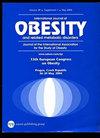节食或减肥手术后胃肠激素的血浆浓度和主观食欲评分:DISGAP 研究的 1 年结果。
IF 4.2
2区 医学
Q1 ENDOCRINOLOGY & METABOLISM
引用次数: 0
摘要
目的:减肥手术和单纯饮食限制的长期减肥效果截然不同。这是第一项研究,旨在调查仅通过极低能量(VLED)诱导初始减肥(对照组)或通过减肥手术初始减肥(对照组)1年随访期间,参与食欲调节的胃肠道(GI)激素和主观食欲感觉的变化:方法:招募计划接受袖带胃切除术(SG)(19 人)或 Roux-en-Y 胃旁路术(RYGB)(19 人)的患者和对照组(16 人)。所有组别都接受了为期 10 周的 VLED(初始阶段),然后是为期 9 个月的维持阶段。在基线、第11周(W11)和1年随访期间,测量了餐前和餐后的体重/体型、胃泌素、胰高血糖素样肽1(GLP-1)、肽YY(PYY)、胆囊收缩素(CCK)的血浆浓度以及食欲评分:完成所有三次随访的参与者均纳入分析。各组最初的体重/体型变化相当。从第 11 周到第 1 年,SG 组(n = 11)和 RYGB 组(n = 12)的体重持续下降,而对照组(n = 12)的体重有所恢复。减肥手术后,餐后 GLP-1 随时间推移而增加,对照组则保持不变且更低。餐后PYY在所有组别中都有所增加,但在RYGB术后增幅最大。基础胃泌素在 SG 术后随着时间的推移而降低,而在 RYGB 和节食术后分别出现了少量或明显的增加,对照组在 1 年时基础和餐后胃泌素浓度最高。对照组的基础和餐后 CCK 在 1 年时有所降低,而减肥手术后则未观察到任何变化。总体而言,随着时间的推移,主观食欲评分变化不大:结论:SG 和 RYGB 术后 1 年随访体重变化时,胃肠道激素情况有利于降低进食动力和增加饱腹感。临床试验注册:clinicaltrials.gov NCT04051190。本文章由计算机程序翻译,如有差异,请以英文原文为准。

Plasma concentration of gastrointestinal hormones and subjective appetite ratings after diet or bariatric surgery: 1-year results from the DISGAP study
Long-term weight loss outcomes are contrasting between bariatric surgery and dietary restriction alone. This is the first study to investigate changes in gastrointestinal (GI) hormones involved in appetite regulation, and subjective appetite feelings, at 1-year follow-up, after initial weight loss induced by a very-low energy (VLED) alone (controls), or with bariatric surgery. Patients scheduled for Sleeve Gastrectomy (SG) (n = 19) or Roux-en-Y gastric Bypass (RYGB) (n = 19), and controls (n = 16) were recruited. All groups underwent 10 weeks of a VLED (initial phase), followed by a 9-month maintenance phase. Body weight/composition, plasma concentrations of ghrelin, glucagon-like peptide 1 (GLP-1), peptide YY (PYY), cholecystokinin (CCK), and appetite ratings were measured before and after a meal, at baseline, week 11(W11), and 1Y follow-up. Participants who completed all three follow ups were included in the analysis. Initial changes in body weight/composition were comparable across groups. SG (n = 11) and RYGB (n = 12) continued to lose weight from W11 to 1Y, whereas controls (n = 12) had regained weight. Postprandial GLP-1 increased over time post bariatric surgery and remained unchanged and lower in controls. Postprandial PYY increased in all groups, but greatest post-RYGB. Basal ghrelin decreased over time post-SG, while a small or marked increase was seen after RYGB and diet, respectively, with the control group exhibiting the greatest basal and postprandial concentrations at 1Y. A reduction in basal and postprandial CCK was seen in controls at 1Y, while no changes were observed post-bariatric surgery. Overall, small changes in subjective appetite ratings were seen over time. Weight change at 1Y follow up after SG and RYGB is followed by a GI hormone profile favoring a lower drive to eat and increased satiety. The opposite is seen 1Y after WL induced by dietary restriction alone. clinicaltrials.gov NCT04051190.
求助全文
通过发布文献求助,成功后即可免费获取论文全文。
去求助
来源期刊

International Journal of Obesity
医学-内分泌学与代谢
CiteScore
10.00
自引率
2.00%
发文量
221
审稿时长
3 months
期刊介绍:
The International Journal of Obesity is a multi-disciplinary forum for research describing basic, clinical and applied studies in biochemistry, physiology, genetics and nutrition, molecular, metabolic, psychological and epidemiological aspects of obesity and related disorders.
We publish a range of content types including original research articles, technical reports, reviews, correspondence and brief communications that elaborate on significant advances in the field and cover topical issues.
 求助内容:
求助内容: 应助结果提醒方式:
应助结果提醒方式:


